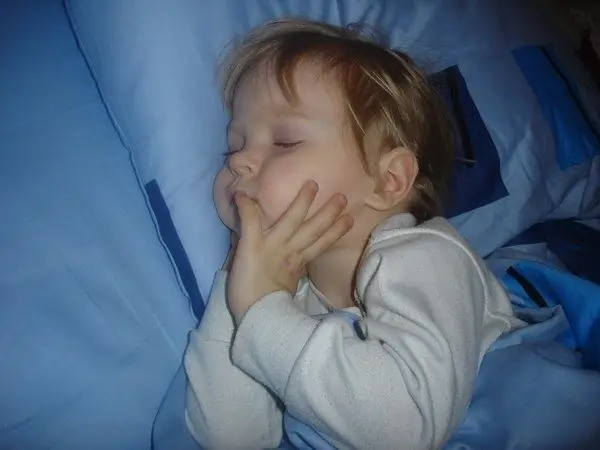- Author Horace Young [email protected].
- Public 2023-12-16 10:35.
- Last modified 2025-01-23 11:41.
Bruxism (gnashing of teeth resulting from uncontrolled contraction of the masticatory muscles) occurs most often at night and occurs in about 50% of children. The causes of this phenomenon have not been established.

Instructions
Step 1
The widespread belief that if a child creaks his teeth in a dream, it means he has worms, is completely wrong. During the onset of episodes of nocturnal bruxism, there is a change in pulse, pressure, respiration. However, no connection has been found between teeth grinding in sleep and mental or physical problems in the child. For most children, over time, everything will return to normal by itself.
Step 2
But it would be wrong to consider teeth grinding in a dream as a completely harmless phenomenon. Usually attacks of bruxism last up to 10 seconds and can be repeated several times a night. After especially severe attacks, the child may wake up with a headache and toothache, the joint connecting the upper and lower jaws may be damaged, tension may appear in the muscles of the neck and back, and sometimes damage to the tooth enamel and soft tissues is observed.
Step 3
If attacks of bruxism are constantly repeated and do not disappear for several months, consult a neurologist and dentist. Usually, in such cases, dentists suggest using a special splint, which will prevent damage to the tooth enamel.
Step 4
If episodes of bruxism are rare, there is a lot that parents can do themselves to help their child get rid of the bruxism phenomenon. Teach him to keep his jaws slightly open with his lips closed so that the teeth do not touch.
Step 5
Limit the consumption of animal fats, sugar, fast food. Give fruits and vegetables (hard apples, carrots, cabbage) that require muscle tension in the chewing muscles during the day, which will reduce their activity at night.
Step 6
Do not feed your baby at night. The last meal should be no later than an hour before bedtime. Before going to bed, you can only give water.
Step 7
Make sure your child's activities are calm before bed. Read a book to him, start collecting puzzles together. During this time, the baby will have time to calm down, the tension of the muscles and the nervous system caused by active games will subside. He will sleep peacefully.
Step 8
Be considerate of your child. Talk to him, find out what caused his anxiety (stress can provoke the occurrence of bruxism). Try to help him solve the problems that have arisen and calm him down.
Step 9
If episodes of bruxism recur over and over again, be sure to see your doctor.






